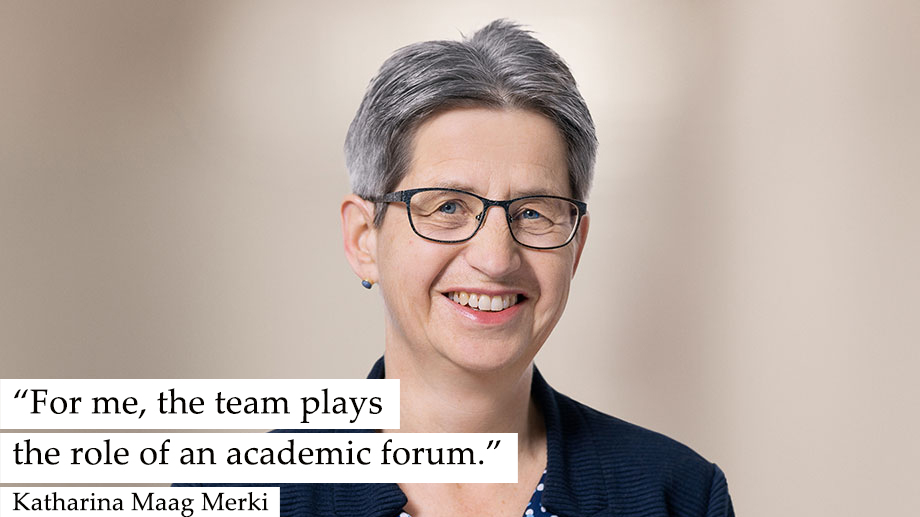Navigation auf uzh.ch
Navigation auf uzh.ch

Besides doing research and teaching, professors spend a significant portion of their time supervising PhD candidates. They help them transition into the academic community and provide crucial support. By leading by example, professors motivate the next generation of researchers. But what makes a good mentor? And what are the hallmarks of quality supervision?
The Graduate Campus recently introduced the Mentoring Award to address these questions and increase the visibility of excellent supervision. Some 90 PhD candidates from across UZH’s faculties responded to the call for nominations. The jury, made up of five junior UZH researchers, looked at the nominations in detail and handpicked three winners. One of winners of the inaugural award is Katharina Maag Merki, professor of educational science at the Institute of Education.
The UZH News team met with her to discuss her role as mentor and supervisor.
I was speechless and touched. I wasn’t even aware that my PhD candidates had nominated me. But I’m very happy that the jury chose me as one of the winners. It’s an honor.
Well, what does “perfect” mean? Of course, not everything always goes according to plan, but I always try to face the challenges that arise and improve things. I think that’s also something junior researchers noticed.
I engage in an in-depth dialogue with my PhD candidates. We set ambitious goals – but I never demand of others what I wouldn’t also ask of myself. Earning a PhD under my supervision means that you need to see yourself as part of a team. That’s very important to me. I think it’s important that PhD candidates are successful and that we as a team are visible. If that succeeds, everyone benefits. I expect team members to share their ideas and support each other.
You don’t have to take part in every single social event, and it’s also OK if you withdraw from the scientific discourse from time to time. But for me, the team plays the role of an academic forum. Research projects in empirical educational science can’t be completed on your own. You need the feedback and support of a team.
One of the challenges is striking a balance between my own priorities and the junior researchers’ goals. My main priority is conducting research at my chair. At the same time, junior researchers need to be able to advance their own careers, so that one day they can move on to the next role or land a professorship.
It’s always a challenge for me if PhD candidates have the support they need but don’t make any progress, for example when they can’t manage to come up with an interesting research question or theory model, even after we’ve talked things through time and again. Those are the moments when I have to say: That’s not going to do.
I raise the topic with the candidate, and together we try to find out the reasons and what needs to be done to fix the situation.
The responses vary. It can be very difficult if for example my own perception differs from the PhD candidate’s. But it can also be a relief when they realize that they’re not making any progress in their work and are dissatisfied. The important thing is to find a way forward together and decide whether it makes sense to continue working together. My job as a supervisor is to open doors for junior researchers embarking on their careers. But sometimes I have to close doors too, and I always get upset when that happens. It’s easier to say at an early stage things aren’t working, though.
Besides progress meetings and career discussions every six months, weekly research project meetings and monthly chair meetings, I think it’s also important to regularly get together with my PhD candidates outside of the university – to meet for drinks after work, for example, and talk about anything and everything.
As a team, we also think about which conferences or meetings would be interesting, who we could invite as guest speakers, and we also work together to plan research stays. It’s important that junior researchers can build up a network.
I discuss matters related to supervising with others in the research community and get their advice whenever I get stuck. And there are many topics that I discuss with my assistant. She knows the team very well, and it always helps to find out how she thinks.
I didn’t complete any particular continuing education course. I learned the most by thinking about my own experiences and exploring what it means to be a mentor. My specialist knowledge as an educational scientist also certainly came in handy.
All departments and institutes at the Faculty of Arts and Social Sciences have developed concepts to promote the careers of junior researchers, and have also set out the structures and processes that need to be in place. We now have to see how they are implemented – and adjust some of the conditions.
We should also increase the number of permanent positions for postdocs. Some believe that people get a little too comfortable when they’re offered permanent employment, but I don’t share that view. Also, after getting their PhD, many women start thinking about starting a family, and it’s very difficult to do so if you have to look for a new job every two years. That shouldn’t have to be the case.
I want the money to benefit the entire chair, so it will be paid into an account for third-party funds.